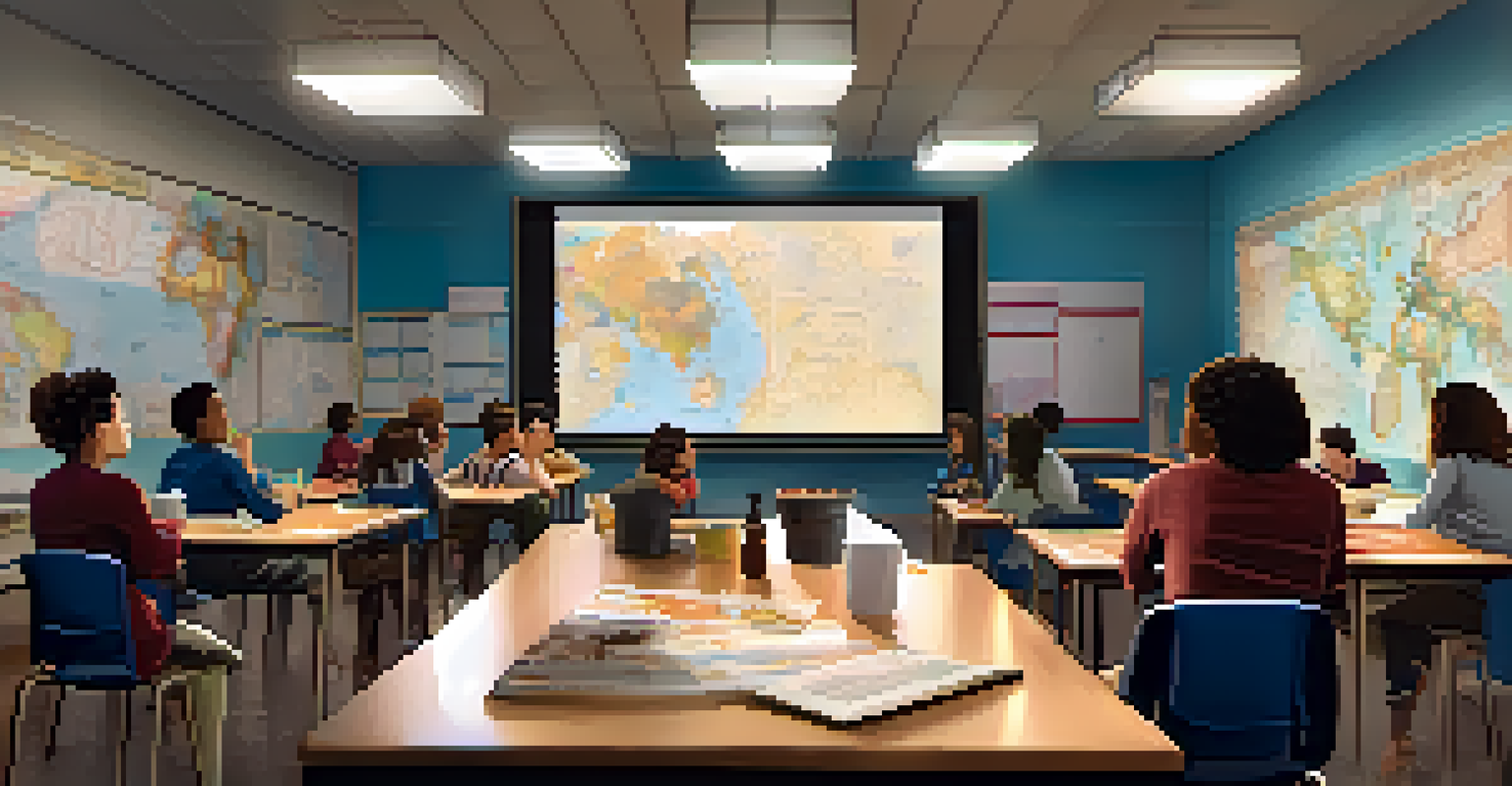Analyzing the Impact of Documentary Films on Public Opinion

Understanding Documentary Films and Their Purpose
Documentary films serve a unique purpose in storytelling, often aiming to educate and inform the audience about real-life topics. Unlike fictional films, documentaries rely on factual content, presenting a narrative that reflects reality. This authenticity draws viewers in, encouraging them to engage critically with the issues showcased.
Documentaries are a powerful way to tell stories that can change the way we see the world.
By highlighting social, political, or environmental issues, documentaries can provoke thought and spark conversations among viewers. For instance, films like 'An Inconvenient Truth' brought climate change to the forefront of public discourse. As audiences watch these films, they are not just entertained; they are also challenged to reconsider their perspectives.
Ultimately, documentaries hold the potential to reshape how people perceive the world around them. They create an emotional connection with the subject matter, often leading to increased awareness and even advocacy for change. This is where the intersection of film and public opinion becomes particularly fascinating.
The Role of Storytelling in Documentaries
Storytelling is at the heart of every documentary, transforming raw data and facts into compelling narratives. By weaving personal stories with larger themes, filmmakers can evoke empathy and understanding from the audience. This emotional engagement is crucial, as it helps viewers connect with the issues on a personal level.

Take, for example, the documentary '13th,' which explores the history of racial inequality in the United States. Through powerful personal accounts and historical footage, it makes the complex issue of systemic racism accessible and relatable. Viewers not only learn but also feel compelled to reflect on their own beliefs and biases.
Documentaries Educate and Inform
Documentary films provide factual narratives that educate audiences about real-life social, political, and environmental issues.
This storytelling aspect is essential in shaping public opinion, as it can challenge preconceived notions and foster a deeper understanding of societal issues. When a story resonates, it encourages viewers to discuss, share, and even advocate for change, amplifying the documentary's impact.
Documentaries as Tools for Advocacy
Documentary films often serve as powerful tools for advocacy, shining a light on underrepresented voices and critical issues. By bringing attention to topics that may be overlooked, they can mobilize viewers to take action. For instance, films addressing issues like poverty, human rights, or environmental degradation can inspire audiences to get involved.
The best documentaries create a connection between the viewer and the subject, evoking empathy and understanding.
One notable example is 'The Act of Killing,' which confronts the legacy of genocide in Indonesia. By showcasing the stories of those affected, the film not only informs but also calls for justice and reconciliation. This blend of storytelling and advocacy can lead to significant public discourse and policy changes.
Thus, documentaries not only inform but also empower viewers to become advocates themselves. They illustrate that film can be a catalyst for social change, encouraging society to rethink its values and priorities.
The Emotional Impact of Documentary Films
The emotional impact of documentaries is one of their most significant attributes, often leaving lasting impressions on viewers. By confronting difficult truths and personal stories, these films can evoke a wide range of emotions, from sadness to anger to hope. This emotional resonance can be a driving force in shaping public opinion.
For example, 'Won't You Be My Neighbor?' explores the life of Fred Rogers and his commitment to kindness and empathy. Viewers are moved not just by his story but also by the larger message of compassion and understanding. This emotional connection can inspire audiences to reflect on their behavior and attitudes.
Storytelling Drives Emotional Impact
By weaving personal stories into larger themes, documentaries evoke empathy and encourage viewers to reflect on their beliefs.
Ultimately, the emotional depth of documentaries helps to build a bridge between the film and its audience. When viewers feel a connection to the subject matter, they are more likely to share their experiences and engage in discussions, further influencing public opinion.
The Influence of Social Media on Documentary Reach
In today's digital age, social media plays a crucial role in expanding the reach of documentary films. Platforms like Facebook, Twitter, and Instagram allow filmmakers to share their work with a global audience in an instant. This accessibility enhances the potential for documentaries to influence public opinion rapidly.
For instance, the viral success of documentaries like 'Tiger King' demonstrates how social media can create a buzz and drive viewership. As people share their thoughts and reactions online, discussions about the film's themes and issues can spread like wildfire. This phenomenon can lead to a more informed public and increased engagement with the documentary's subject matter.
Moreover, social media allows for real-time conversations, where viewers can discuss their perspectives and engage with filmmakers. This interactive element further enriches the documentary experience, creating a community around the issues presented and amplifying their impact on public opinion.
Documentaries and Their Role in Education
Documentaries also play a vital role in education, serving as valuable resources for both teachers and students. By providing visual and narrative context to complex topics, they can enhance learning and comprehension. This educational aspect can significantly shape how individuals form opinions about various issues.
For example, documentaries used in classrooms can foster discussions about social justice, history, or science. Films like 'Food, Inc.' can spark conversations about food production and sustainability, encouraging students to think critically about their choices. This engagement can lead to informed opinions that extend beyond the classroom.
Social Media Amplifies Documentary Reach
Platforms like Facebook and Twitter enhance the visibility of documentaries, fostering discussions that influence public opinion.
In this way, documentaries not only inform but also empower the next generation. By integrating film into educational curricula, educators can inspire students to explore these critical issues and develop their perspectives, ultimately shaping future public opinion.
The Future of Documentaries and Public Opinion
As we look to the future, the role of documentaries in shaping public opinion is likely to evolve further. With advances in technology and the increasing popularity of streaming platforms, more filmmakers have the opportunity to share their stories. This democratization of film can lead to a more diverse range of voices and perspectives being represented.
Moreover, as societal issues become more complex, documentaries may need to adapt to address these challenges effectively. Filmmakers will likely experiment with new formats, such as interactive documentaries or virtual reality experiences, to engage audiences on deeper levels. This innovation can enhance the emotional impact and educational value of documentaries.

Ultimately, the enduring power of documentary films lies in their ability to inform, inspire, and provoke change. As they continue to evolve, they will undoubtedly remain a significant force in shaping public opinion and encouraging social discourse.